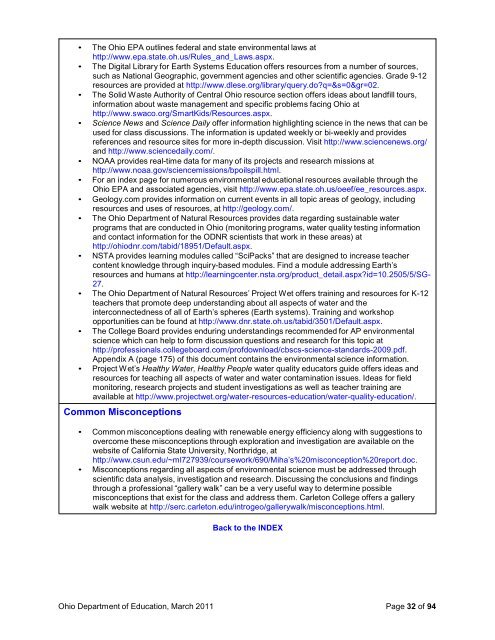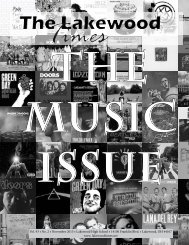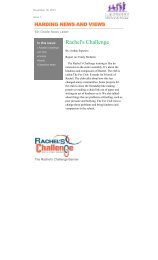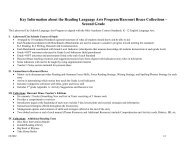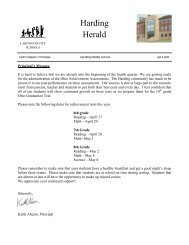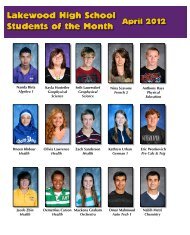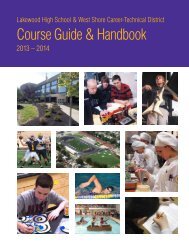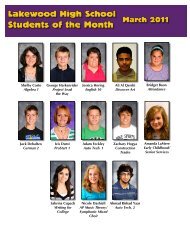Ohio Revised Science Standards and Model Curriculum High School
Ohio Revised Science Standards and Model Curriculum High School
Ohio Revised Science Standards and Model Curriculum High School
You also want an ePaper? Increase the reach of your titles
YUMPU automatically turns print PDFs into web optimized ePapers that Google loves.
• The <strong>Ohio</strong> EPA outlines federal <strong>and</strong> state environmental laws at<br />
http://www.epa.state.oh.us/Rules_<strong>and</strong>_Laws.aspx.<br />
• The Digital Library for Earth Systems Education offers resources from a number of sources,<br />
such as National Geographic, government agencies <strong>and</strong> other scientific agencies. Grade 9-12<br />
resources are provided at http://www.dlese.org/library/query.do?q=&s=0&gr=02.<br />
• The Solid Waste Authority of Central <strong>Ohio</strong> resource section offers ideas about l<strong>and</strong>fill tours,<br />
information about waste management <strong>and</strong> specific problems facing <strong>Ohio</strong> at<br />
http://www.swaco.org/SmartKids/Resources.aspx.<br />
• <strong>Science</strong> News <strong>and</strong> <strong>Science</strong> Daily offer information highlighting science in the news that can be<br />
used for class discussions. The information is updated weekly or bi-weekly <strong>and</strong> provides<br />
references <strong>and</strong> resource sites for more in-depth discussion. Visit http://www.sciencenews.org/<br />
<strong>and</strong> http://www.sciencedaily.com/.<br />
• NOAA provides real-time data for many of its projects <strong>and</strong> research missions at<br />
http://www.noaa.gov/sciencemissions/bpoilspill.html.<br />
• For an index page for numerous environmental educational resources available through the<br />
<strong>Ohio</strong> EPA <strong>and</strong> associated agencies, visit http://www.epa.state.oh.us/oeef/ee_resources.aspx.<br />
• Geology.com provides information on current events in all topic areas of geology, including<br />
resources <strong>and</strong> uses of resources, at http://geology.com/.<br />
• The <strong>Ohio</strong> Department of Natural Resources provides data regarding sustainable water<br />
programs that are conducted in <strong>Ohio</strong> (monitoring programs, water quality testing information<br />
<strong>and</strong> contact information for the ODNR scientists that work in these areas) at<br />
http://ohiodnr.com/tabid/18951/Default.aspx.<br />
• NSTA provides learning modules called “SciPacks” that are designed to increase teacher<br />
content knowledge through inquiry-based modules. Find a module addressing Earth’s<br />
resources <strong>and</strong> humans at http://learningcenter.nsta.org/product_detail.aspx?id=10.2505/5/SG-<br />
27.<br />
• The <strong>Ohio</strong> Department of Natural Resources’ Project Wet offers training <strong>and</strong> resources for K-12<br />
teachers that promote deep underst<strong>and</strong>ing about all aspects of water <strong>and</strong> the<br />
interconnectedness of all of Earth’s spheres (Earth systems). Training <strong>and</strong> workshop<br />
opportunities can be found at http://www.dnr.state.oh.us/tabid/3501/Default.aspx.<br />
• The College Board provides enduring underst<strong>and</strong>ings recommended for AP environmental<br />
science which can help to form discussion questions <strong>and</strong> research for this topic at<br />
http://professionals.collegeboard.com/profdownload/cbscs-science-st<strong>and</strong>ards-2009.pdf.<br />
Appendix A (page 175) of this document contains the environmental science information.<br />
• Project Wet’s Healthy Water, Healthy People water quality educators guide offers ideas <strong>and</strong><br />
resources for teaching all aspects of water <strong>and</strong> water contamination issues. Ideas for field<br />
monitoring, research projects <strong>and</strong> student investigations as well as teacher training are<br />
available at http://www.projectwet.org/water-resources-education/water-quality-education/.<br />
Common Misconceptions<br />
• Common misconceptions dealing with renewable energy efficiency along with suggestions to<br />
overcome these misconceptions through exploration <strong>and</strong> investigation are available on the<br />
website of California State University, Northridge, at<br />
http://www.csun.edu/~ml727939/coursework/690/Miha’s%20misconception%20report.doc.<br />
• Misconceptions regarding all aspects of environmental science must be addressed through<br />
scientific data analysis, investigation <strong>and</strong> research. Discussing the conclusions <strong>and</strong> findings<br />
through a professional “gallery walk” can be a very useful way to determine possible<br />
misconceptions that exist for the class <strong>and</strong> address them. Carleton College offers a gallery<br />
walk website at http://serc.carleton.edu/introgeo/gallerywalk/misconceptions.html.<br />
Back to the INDEX<br />
<strong>Ohio</strong> Department of Education, March 2011 Page 32 of 94


